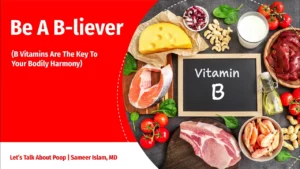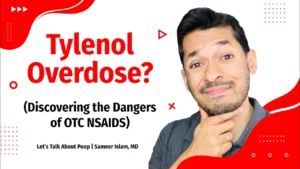Peptic ulcers are painful sores that can appear in the stomach or small intestine, usually caused by H Pylori infection or the overuse of NSAIDs. Symptoms of an ulcer include pain in the abdomen, indigestion, weight loss, feeling full quickly, black stools, and feeling tired. It is important to protect oneself from developing ulcers by avoiding H Pylori infections and using over the counter pain medications carefully. If experiencing stomach pain, talk to one’s healthcare provider as it is a medical emergency. Appropriate testing to determine if ulcer is present should also be done with the guidance of a doctor.
VIDEO HIGHLIGHTS
- The two main causes of an ulcer are infection (H Pylori) and non-steroidal anti-inflammatory drugs (NSAIDs).
- Risk factors for developing an ulcer include smoking, drinking alcohol, stress and spicy foods.
- Symptoms of an ulcer can include pain in the abdomen area that gets worse after eating; indigestion; weight loss; black stools or becoming anaemic.
- To protect against getting anulcers: guard against infections like H Pylori by washing hands & utensils when handling food; be careful with taking pain medications & speak to a healthcare provider about whether protection is needed to help your stomach do its job if taking these medications regularly
FULL TRANSCRIPT
So maybe you feel a pain in your stomach, you’re wondering what the heck is going on. Maybe I need to stretch or move around. Or maybe it’s something you ate or it could be a sign of something more ominous like an ulcer. In today’s video we’re going to talk about haptic ulcer disease sounds like a very fancy term. So we’ll explain exactly what exactly is an ulcer, how they present themselves, what are the causes and risk factors for an ulcer, what symptoms should you feel if you have an ulcer. And at the very end of the video I’m gonna tell you what I recommend as a GI doctor to make sure you don’t get an ulcer. Guys, let’s talk about poop. How do y’all, Dr. Islam here, a k a, your poop guru trying to give you the best tips and tricks so you can live your best life from the top all the way down to the bottom. So I’m gonna tell you about a patient of mine. Name Joe. No, Joe came to see me cuz he was having really, really bad stomach pain. He had this pain right here in the middle of his abdomen, just right here. It was a nine pain, it seemed to get worse after he ate and nothing seemed to make it better. In fact, he even noticed he started to have some black stools associated with that. So I was really worried that he was having an ulcer. So I ordered and did what’s called an upper endoscopy or an E G D where he has a very small camera.
And I took a look to see exactly what was going on in that stomach. And lo and behold, yes, we actually did diagnose him with an ulcer. It was due to an infection. We treated the ulcer, got his infection taken care of, and he became symptom free after that. And he had no other issues after that. So what exactly is a peptic ulcer?
Ulcers are sores that are inside your stomach and they basically happen in two main places. One is that you have that store, an actual your stomach area called a gastric ulcer. And another area is that you can have in your small intestine or your dewatum called a duodenal ulcer. And when you have these sores, basically part of your GI tract is getting torn up and destroyed from the inside.
It literally is a sore where you have a crater that’s there and that crater over time can lead to pretty bad complications. Now there are two main causes of people having ulcers and it may be different than what you think. Number one is an infection called h pylori. Now h pylori is the most common cause of ulcers in the world. This is a bacterial infection that you can get for any number, different reasons that can dig a hole inside your stomach and cause inflammation and an ulcer to occur. Now the second cause of an ulcer may be something you may be surprised with, but it is medications, things like Aleve, naproxen, Advil, Motrin, sometimes even aspirin as well. These are called non-steroidal anti-inflammatory drugs or NSAIDs. And these very calmly are used for joint pain.
Headaches, kind of just aches and things like that. But if it’s used too much or without protection, it can actually lead to damage inside your stomach to have a ulcer and have that sore that’s there. Now you may have heard that things like stress or foods can cause ulcer like symptoms, but so far the data does not seem to suggest that. Now it may make you feel like you have an ulcer or it can aggravate certain gut conditions.
We don’t have any evidence that stress or spicy food can actually create the ulcer itself. In addition to that, there are some risk factors that can make it more likely for you to develop and ulcer. This includes smoking, drinking, alcohol, and like the two I mentioned before, lots of stress and spicy foods. Now these alone will not cause ulcers, but if you combine this with that infection called H Polaroid or taking non-steroidal anti-inflammatory medications, it’s almost as if you’re having doubling the impact in your gut to increase that risk significantly at developing that ulcer. So where are the symptoms of an ulcer? The most common symptom is pain, really, really bad pain right in the middle of your adjuvant. It’s a gnawing pain that sometimes can go into your back.
It can sometimes be associated with eating. But other issues include indigestion, weight loss, getting full quicker, just not feeling good, tired, black stools or becoming anemic. If you have any of these, these could be signs or symptoms of an ulcer, but there are plenty of ulcers that don’t even have any of the classical symptoms that are there or that may be asymptomatic.
And this is the issue when it comes to ulcer disease. Now, if you find yourself constantly popping those tongues or taking Mylan or Pepto-Bismol, you don’t understand why that alone could be the sign that you’re having an ulcer inside your GI tract. All right, now that I scare the living, but Jesus outta you when it comes to ulcers. What can you do today to protect yourself from getting an ulcer here?
Two things I recommend. Number one, guard against infections that age polari infection. The most common way to get this is typically from your hands or food. So make sure you wash your hands. Eat clean food, make sure your utensils are washed. Do everything you can to protect yourself from this infection. Number two, be careful of pain medication. These medications that we use over the counter for headaches, joint pain, things like that, we think they may be safe because they’re over the counter, but they may not be. And if you have those risk factors and you take these medications, you are setting yourself up to get an ulcer. Be careful, watch what you’re taking and make sure that you take it in the appropriate fashion. And also make sure if you’re taking these medications, you talk to your healthcare provider about whether you need protection to make sure you are helping your stomach do its job. So here’s what I want you to do today. If you are experiencing stomach pain, taking a lot of Tums Pepto-Bismol and you don’t know why, don’t ignore this because this can be a medical emergency. You need to see a doctor, speak to your doctor, tell him what’s going on because you need appropriate testing to see if you have an ulcer or not. So my question today for you, what questions do you have about ulcer disease? What concerns you have? Have you ever had an ulcer? Let me know in the comments down below. I would love to hear what you guys have to say. I wanna thank you for watching.
Don’t forget to smash that like button. Like, share, and subscribe. And if you haven’t already, don’t forget to subscribe to my weekly newsletter. Don’t forget, let’s talk about poop.



